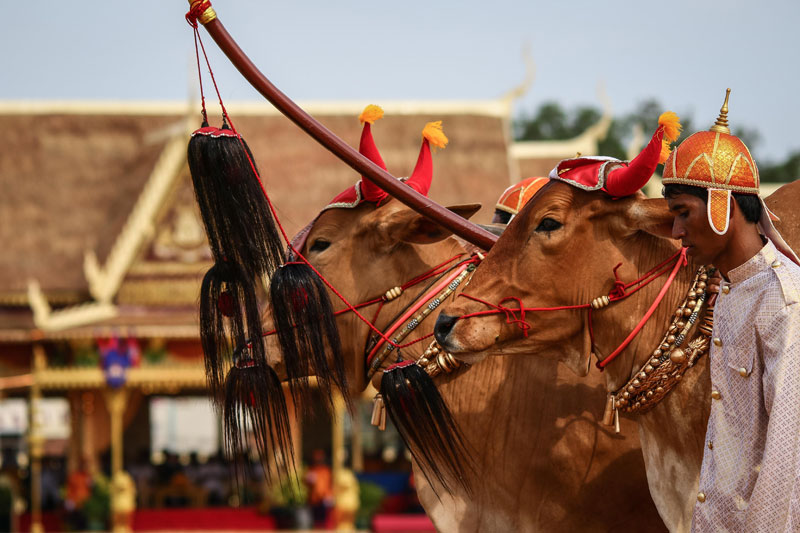The holy oxen turned down their daily fare of grass at the Royal Plowing Ceremony in Battambang City on Wednesday, instead snacking on corn and beans, suggesting that farmers will enjoy bumper harvests of those crops in the year ahead.
Battambang provincial governor Chan Sophal and his wife, Kim Bunara, played the coveted roles of Sdach Meak and Mehour at the lavish, televised ceremony on a football pitch in the northern city, sprinkling rice seeds in a plow’s furrow as King Norodom Sihamoni and a posse of high-ranking officials looked on.

But what the dignitaries had really come to see were the oxen, on whose muzzles—which would lead each animal to feed from one of seven bowls containing corn, beans, rice, sesame, water, rice wine or grass—the country’s agrarian fortunes hinge.
“The royal oxen ate beans and corn,” Kong Kan, the Royal Palace’s chief Brahmin priest and astrologer, announced to the 1,000-strong crowd via a public address system. “This year, those crops will yield.”
A quick glance over the oxen’s preferences over the past five years, however, might make farmers reconsider swapping crops on the back of such predictions. In 2014, the oxen chose corn and beans, later nibbling at the rice. The year before that, they ate corn and grass. And 2012, 2011 and 2010 were all corn and bean years.
But with the rice-planting season underway in some provinces and the rains soon to fall, attention turned Wednesday to the country’s main staple, with a number of farmers worried about the future foretold by the oxen.
“Do not be concerned that the oxen did not eat rice,” Mr. Kan said later by phone, encouraging farmers to look at the positives. “The oxen ate almost all the corn and beans, so those crops will have great yields.”
But for Im Sakhoeun, a 59-year-old farmer in Battambang’s Ratanak Mondol district, corn and bean yields mean nothing. On her five hectares of land, she grows rice.
“I am worried that this year’s rice paddy will be no good because there is not enough water,” she said, going on to compare this year’s weather patterns to those in 2014.
“Last year, rice paddy grew well because the rain came at the beginning and in the middle of the year. But this year, the rain has not started,” she said. “Also, [this year] the oxen did not eat rice.”
Ms. Sakhoeun said she believed the astrologer’s readings of the oxen’s tastes were spot-on. “I believe the predictions because it is Khmer tradition. When they make predictions based on what the oxen eat, we can see that what they say is what happens,” she said.
Soeung Siem, 39, a farmer in Kompong Speu province’s Samraong Tong district, was more practical.
“The important things that rice crops depend on are weather and enough rain,” he said, adding that he had about five percent confidence in the Royal Plowing Ceremony’s predictions.
Hean Vanhan, a deputy department director at the Ministry of Agriculture, was also pragmatic. Reached by telephone, Mr. Vanhan said that despite the royal oxen’s predilection for corn and beans, farmers should use common sense.
The plowing ceremony, he said, “is part of our faith and tradition.
“If we believe it entirely and give up sowing our other crops, then there will be no yield,” he added.



